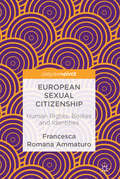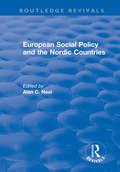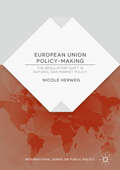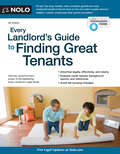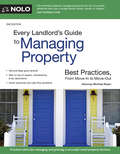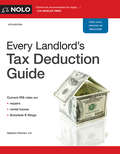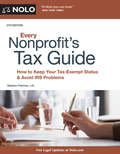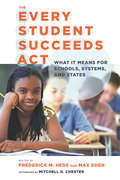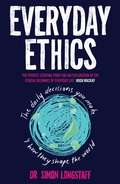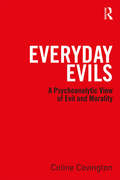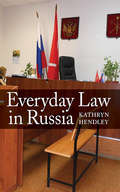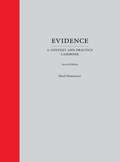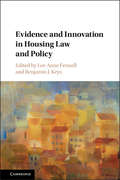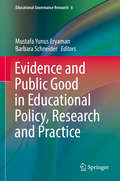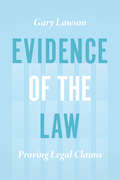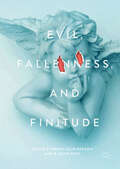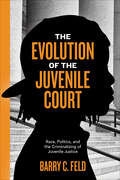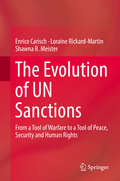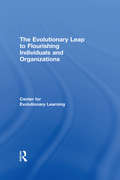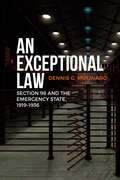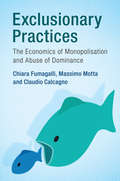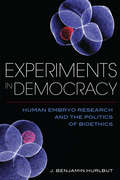- Table View
- List View
European Sexual Citizenship: Human Rights, Bodies and Identities
by Francesca Romana AmmaturoThis book is an innovative and critical contribution to the study of the human rights of lesbian, gay, bisexual, transgender, intersex and queer (LGBTIQ) people in the context of Europe. Combining legal and Foucauldian approaches, it investigates the ways in which current discourses about LGBTIQ rights in Europe are tightly bound to contemporary debates about national and trans-national citizenship. The author defines and analyzes the concept of 'multisexual citizenship' to illustrate new, flexible forms of sexual and gendered citizenship that could radically transform practices of citizenship and the current human rights framework in Europe. She does this by combining critical deconstructions of the case law of the European Court of Human Rights with ethnographic observations and sociological analysis. This interdisciplinary work will appeal to sociologists, lawyers and researchers of gender and LGBTIQ rights.
European Social Policy and the Nordic Countries
by Alan C. NealThis title was first published in 2000: The contributions to this volume have been brought together and edited from presentations made to a two-day seminar held in Brussels with the financial and organisational support of the social affairs directorate of the European Commission on 15th and 16th May 1995. That seminar provided an important first opportunity, following accession to membership of the European Community by Finland and Sweden, for representatives of the Commission to discuss with delegates from all of the significant labour market organisations throughout the Nordic countries some of the challenges and fears raised by the superimposition of a European-level framework upon the fabled social structures of those Nordic countries.
European Union Policy-Making
by Nicole HerwegThis book furthers the ongoing theoretical development of the multiple streams framework, assessing its applicability to European Union (EU) policy-making processes. It systematically defines and identifies functional equivalents for all of the framework's core concepts at the EU level and extends the framework in order to explain agenda-setting and decision-making. Furthermore, the book derives a set of explicit hypotheses to empirically assess the extent to which the (modified) framework is able to explain timing, agenda prominence, and policy change (or a lack thereof) for the EU natural gas directives passed in 1998, 2003, and 2009. The analysis documents that the framework is well-suited to explain the EU policy process in general and reveals where additional theoretical refinements are required.
Every Landlord's Guide to Finding Great Tenants
by Janet PortmanSearching for the perfect tenant? Get the only book devoted to the most important decision a landlord can make! Landlords face many challenges, but choosing new tenants has the greatest potential to affect your bottom line. Fortunately, Every Landlord's Guide to Finding Great Tenants can help you find the right tenant for your rental property! Let this book guide you through the process of attracting, screening and selecting the best renters available. Get timely advice on: effective advertising phone screening presenting the unit evaluating applications examining credit reports checking references discrimination basics making a rental offer, and rejecting applicants. Every Landlord's Guide to Finding Great Tenants provides dozens of forms and checklists for every step, with easy instructions to fill them out. This edition has been fully updated to reflect the latest changes in the law in your state, including rules about checking a potential tenant's immigration status. Plus, get all the legal forms you need, as well as invaluable audio dialogues that show you how to conduct interviews and get essential information without running afoul of the law.
Every Landlord's Guide to Managing Property: Best Practices, From Move-In to Move-Out
by Michael BoyerThe ultimate property management guide for the do-it-yourself landlord! Written for the millions of landlords who own a single-family home, condo, or small (less than four unit) multiplex, Every Landlord’s Guide to Managing Property helps them learn how to keep their day job and manage their properties (and tenants) on the side. It provides the best practical and legal compliance advice for small-time landlords who want to manage and grow a successful rental property business with a personalized approach and minimal hassle and cost. Every Landlord’s Guide to Managing Property focuses on everyday skills the do-it-yourself landlord needs, including property oversight and maintenance, effective communication with tenants, and general management. It covers a wide range of topics, such as how to: market and differentiate your rental units from the competition handle nitty-gritty maintenance—from snow removal to toilet clogs to painting screen and deal with tenant issues like late rent payments, pet problems, clutter, unauthorized occupants, and other conflicts track income and expenses for filing taxes and completing Schedule E hire and work with outside contractors, lawyers, and other help, and much more.
Every Landlord's Tax Deduction Guide
by Stephen FishmanMaximize your tax deductions Rental real estate provides more tax benefits than almost any other investment. Whether you own a ten-unit rental apartment building or rent a room in your home through Airbnb, you need to know about all the valuable deductions you are entitled to take as a landlord. Every Landlord's Tax Deduction Guide is the only book that focuses exclusively on IRS rules and deductions for landlords. With this book, you will learn about: depreciation, casualty and theft losses, start-up expenses, and other common landlord deductions IRS rules on deducting repairs and improvements vacation home tax rules, and proper record keeping and accounting, and much more. The book also covers landlord tax classifications, reporting rental income, hiring workers, and deducting rental losses. Filled with practical advice and real-world examples, Every Landlord's Tax Deduction Guide will save you money by making sure you owe less to the IRS at tax time. This edition is updated and revised to cover tax rules for Airbnb-type rentals.
Every Nonprofit's Tax Guide: How to Keep Your Tax-Exempt Status & Avoid IRS Problems
by Stephen FishmanThe essential tax reference book for every nonprofit Nonprofits enjoy privileges not available to other organizations. But these privileges come at a price: Nonprofits must comply with special IRS rules and regulations. This book covers what your organization must do to maintain its tax-exempt status. Practical, comprehensive, and easy to understand, Every Nonprofit’s Tax Guide explains ongoing and annual IRS compliance requirements for nonprofits, including: a detailed look at Form 990 line-by-line instructions for Form 990-EZ conflicts of interest and compensation rules charitable giving rules unrelated taxable business income rules lobbying and political activity restrictions nonprofit bookkeeping other key tax rules Whether you are just starting your nonprofit or are well established, you’ll find all the information you need to avoid the most common issues nonprofits run into with the IRS.
The Every Student Succeeds Act: What It Means for Schools, Systems, and States (Educational Innovations Series)
by Frederick M. Hess and Max EdenIn this foundational book, Frederick M. Hess and Max Eden bring together a cross-section of respected academics and journalists to examine key aspects of the Every Student Succeeds Act (ESSA). This volume provides a thematic and in-depth analysis of the central provisions of this landmark legislation, presenting a range of perspectives. The contributors—leading researchers, policy analysts, and journalists—explore the conflicts and compromises that shaped the emerging law, outline its core provisions, and trace its implications for urban districts, states, and the federal government. Complementing these descriptions are chapters presenting opposing viewpoints on the law&’s merits and its ramifications for future reform efforts. Enacted in December 2015, ESSA represents a major shift of the federal role in education, and its provisions touch on almost every aspect of education policy. Yet it arrived in something of a whirlwind, and scholars, advocates, and policy makers are struggling to make sense of this new act. By bringing together leading thinkers to make sense of this important law, The Every Student Succeeds Act provides a solid foundation for scholars, advocates, and policy makers as they begin to navigate a new era in education policy.
Everyday Ethics: A Guide For The Ethical Professional
by Dr Simon LongstaffDo I buy eggs laid by free-range chooks or the cheaper ones from caged birds? Do I tell my best friend I saw her boyfriend kissing another girl? Do I lie to my mum by telling her I will wear the jumper she bought me, even though it’s the ugliest jumper in the world? Every day our lives are punctuated by points of decision. Some of these decisions will be momentous, remembered for decades: most will go unnoticed, by us and by others. Yet all our choices matter: taken as a whole, they shape our lives and contribute to the rhythms of the world. In Everyday Ethics, Australia’s leading authority on ethics, Simon Longstaff, provides a map to help you better navigate the landscape of daily decisions more ethically. Using a broad range of topics and examples to provoke eye-opening reflection and discussion, Everyday Ethics is a lesson in how even our smallest choices can matter, and an empowering guide that will help us discover what is ‘good’ and what is ‘right’.
Everyday Evils: A psychoanalytic view of evil and morality
by Coline CovingtonEveryday Evils takes a psychoanalytic look at the evils committed by "ordinary" people in different contexts – from the Nazi concentration camps to Stockholm Syndrome to the atrocities publicized by Islamic State – and presents new perspectives on how such evil deeds come about as well as the extreme ways in which we deny the existence of evil. Concepts of group behaviour, morality, trauma and forgiveness are reconsidered within a multi-disciplinary framework. The psychodynamics of dissociation, and the capacity to witness evil acts while participating in them, raise questions about the origin of morality, and about the role of the observing ego in maintaining psychic equilibrium. Coline Covington examines how we demonize the "other" and how violent actions become normalized within communities, such as during the Rwandan genocide and Polish pogroms. The recent attraction of the millenarian theocracy of the Islamic State also highlights our fascination with violence and death. Covington emphasizes that evil comes about through a variety of causes and is highly contextual. It is our capacity to acknowledge the evils we live with, witness and commit that is vital to how we manage and respond to violence within ourselves and others and in mitigating our innate destructiveness. In conclusion, the book addresses how individuals and societies come to terms with evil, along with the problematic concept of forgiveness and the restoration of good. Everyday Evils blends psychoanalytic concepts together with the disciplines of sociology, history, anthropology, philosophy, theology and studies of violence in order to develop a richer, deeper and more comprehensive understanding of evil. Intending to make the unthinkable thinkable, this book will appeal to scholars from across those disciplines, as well as psychoanalysts, psychotherapists and anyone who has ever asked the question: "How could anyone do something like that?"
Everyday Law in Russia
by Kathryn HendleyEveryday Law in Russia challenges the prevailing common wisdom that Russians cannot rely on their law and that Russian courts are hopelessly politicized and corrupt. While acknowledging the persistence of verdicts dictated by the Kremlin in politically charged cases, Kathryn Hendley explores how ordinary Russian citizens experience law. Relying on her own extensive observational research in Russia's new justice-of-the-peace courts as well as her analysis of a series of focus groups, she documents Russians’ complicated attitudes regarding law. The same Russian citizen who might shy away from taking a dispute with a state agency or powerful individual to court might be willing to sue her insurance company if it refuses to compensate her for damages following an auto accident. Hendley finds that Russian judges pay close attention to the law in mundane disputes, which account for the vast majority of the cases brought to the Russian courts. Any reluctance on the part of ordinary Russian citizens to use the courts is driven primarily by their fear of the time and cost—measured in both financial and emotional terms—of the judicial process. Like their American counterparts, Russians grow more willing to pursue disputes as the social distance between them and their opponents increases; Russians are loath to sue friends and neighbors, but are less reluctant when it comes to strangers or acquaintances. Hendley concludes that the "rule of law" rubric is ill suited to Russia and other authoritarian polities where law matters most—but not all—of the time.
Evidence: A Context and Practice Casebook
by Pavel Wonsowicz<p>This casebook is designed to engage students with a wide range of learning styles and to explore evidence law from the eyes of an advocate. Through a problem-centered approach that focuses on the gray areas of the Federal Rules of Evidence, students will develop a heightened sensitivity to factual and legal arguments that govern the admissibility of evidence. This focus on legal argumentation allows students to actively cultivate an understanding of the legal doctrine behind the Federal Rules of Evidence as well as the role that facts and narrative play in legal reasoning. Exercises, visual aids, and video supplements in each chapter allow students to assess their learning. <p>A single thread that runs through the book is video and case materials surrounding a North Carolina murder trial, State v. Peterson. The trial was memorialized in an award-winning documentary, The Staircase, directed by Jean-Xavier de Lestrade. The casebook follows the trial, including the strategies undertaken by counsel and the battles over evidentiary issues that shaped both sides narratives in the trial. Video excerpts will be provided to the instructor to add a further dimension to student learning and to reach a broad array of learning styles. <p>The new second edition has incorporated pedagogical innovations (including new flowcharts to enhance understanding), updated the law based on amendments to the Federal Rules of Evidence and recent Supreme Court cases, and developed new problems to explore the nuances in the law. The second edition is designed to make it easy for professors to incorporate best practices into their classes in order to train students to be self-directed, successful learners.</p>
Evidence and Innovation in Housing Law and Policy
by Benjamin J. Fennell Lee Anne KeysNo area of law and policy is more central to our well-being than housing, yet research on the topic is too often produced in disciplinary or methodological silos that fail to connect to policy on the ground. This pathbreaking book, which features leading scholars from a range of academic fields, cuts across disciplines to forge new connections in the discourse. In accessible prose filled with cutting-edge ideas, these scholars address topics ranging from the recent financial crisis to discrimination and gentrification and show how housing law and policy impacts household wealth, financial markets, urban landscapes, and local communities. Together, they harness evidence and theory to capture the 'state of play' in housing, generating insights that will be relevant to academics and policymakers alike. This title is also available as Open Access.
Evidence and Public Good in Educational Policy, Research and Practice
by Mustafa Yunus Eryaman Barbara SchneiderThis volume draws together interdisciplinary approaches from political philosophy, social work, medicine and sociology to analyze the theoretical foundations and practical examples of evidence-based and evidence-informed education for the public good. It presents a range of conceptions of the evidence-based and evidence-informed education and a justification for why the particular examples or issues chosen fit within that conception for the sake of public good. It explores the current literature on evidence-based and evidence-informed educational policy, research and practice, and introduces a new term, 'evidence free', meaning actions of some policymakers who disregard or misuse evidence for their own agenda. The demands about the quality and relevance of educational research to inform the policy and practice have been growing over the past decade in response to the Evidence-Based Education movement. However the literature is yet to tackle the question of the interrelationships between evidence, research, policy and practice in education for the public good in an international context. This book fills that gap.
Evidence and the Archive: Ethics, Aesthetics and Emotion
by Katherine Biber Trish LukerThis collection explores the stakes, risks and opportunities invoked in opening and exploring law’s archive and re-examining law’s evidence. It draws together work exploring how evidence is used or mis-used during the legal process, and re-used after the law’s work has concluded by engaging with ethical, aesthetic or emotional dimensions of using law’s evidence. Within socio-legal discourse, the move towards ‘open justice’ has emerged concurrently with a much broader cultural sensibility, one that has been called the "archival turn" (Ann Laura Stoler), the "archival impulse" (Hal Foster) and "archive fever" (Jacques Derrida). Whilst these terms do not describe exactly the same phenomena, they collectively acknowledge the process by which we create a fetish of the stored document. The archive facilitates our material confrontation with history, historicity, order, linearity, time and bureaucracy. For lawyers, artists, journalists, publishers, curators and scholars, the document in the archive has the attributes of authenticity, contemporaneity, and the unique tangibility of a real moment captured in material form. These attributes form the basis for the strict interpretive limits imposed by the rules of evidence and procedure. These rules do not contain the other attributes of the archival document, those that make it irresistible as the basis for creative work: beauty, violence, surprise, shame, volume, and the promise that it contains a tantalising secret. This book was previously published as a special issue of Australian Feminist Law Journal.
Evidence of the Law: Proving Legal Claims
by Gary LawsonHow does one prove the law? If your neighbor breaks your window, the law regulates how you can show your claim to be true or false; but how do you prove that in breaking your window your neighbor has broken the law? American jurisprudence devotes an elaborate body of doctrine—and an equally elaborate body of accompanying scholarly commentary—to worrying about how to prove facts. It establishes rules for the admissibility of evidence, creates varying standards of proof, and assigns burdens of proof that determine who wins or loses when the facts are unclear. But the law is shockingly inexplicit when addressing these issues with respect to the proof of legal claims. Indeed, the entire language of evidentiary proof, so sophisticated when it comes to questions of fact, is largely absent from the American legal system with respect to questions of law. As Gary Lawson shows, legal claims are inherently objects of proof, and whether or not the law acknowledges the point openly, proof of legal claims is just a special case of the more general norms governing proof of any claim. As a result, similar principles of evidentiary admissibility, standards of proof, and burdens of proof operate, and must operate, in the background of claims about the law. This book brings these evidentiary principles for proving law out of the shadows so that they can be analyzed, clarified, and discussed. Viewing legal problems through this lens of proof illuminates debates about everything from constitutional interpretation to the role of stipulations in litigation. Rather than prescribe resolutions to any of those debates, Evidence of the Law instead provides a set of tools that can be used to make those debates more fruitful, whatever one’s substantive views may be. As lawyers, judges, and legal subjects confront uncertainty about what the law is, they can, should, and must, Lawson argues, be guided by the same kinds of abstract considerations, structures, and doctrines long used to make determinations about questions of fact.
Evil, Fallenness, and Finitude
by Bruce Ellis Benson B. Keith PuttThis collection addresses the perennial philosophical and theological issues of human finitude and the potentiality for evil. The contributors approach these issues from perspectives in Continental philosophy relating to phenomenology, philosophical hermeneutics, rabbinical traditions, drawing upon the work of Immanuel Kant, S#65533;ren Kierkegaard, and Paul Ricoeur. While centering on the traditional theme of theodicy, this volume is also oriented to the phenomenology of religion, with contributions across religions and intellectual traditions.
The Evolution of the Juvenile Court: Race, Politics, and the Criminalizing of Juvenile Justice (Youth, Crime, and Justice #4)
by Barry FeldWinner, 2020 ACJS Outstanding Book Award, given by the Academy of Criminal Justice SciencesA major statement on the juvenile justice system by one of America’s leading expertsThe juvenile court lies at the intersection of youth policy and crime policy. Its institutional practices reflect our changing ideas about children and crime control. The Evolution of the Juvenile Court provides a sweeping overview of the American juvenile justice system’s development and change over the past century. Noted law professor and criminologist Barry C. Feld places special emphasis on changes over the last 25 years—the ascendance of get tough crime policies and the more recent Supreme Court recognition that “children are different.”Feld’s comprehensive historical analyses trace juvenile courts’ evolution though four periods—the original Progressive Era, the Due Process Revolution in the 1960s, the Get Tough Era of the 1980s and 1990s, and today’s Kids Are Different era. In each period, changes in the economy, cities, families, race and ethnicity, and politics have shaped juvenile courts’ policies and practices. Changes in juvenile courts’ ends and means—substance and procedure—reflect shifting notions of children’s culpability and competence.The Evolution of the Juvenile Court examines how conservative politicians used coded racial appeals to advocate get tough policies that equated children with adults and more recent Supreme Court decisions that draw on developmental psychology and neuroscience research to bolster its conclusions about youths’ reduced criminal responsibility and diminished competence. Feld draws on lessons from the past to envision a new, developmentally appropriate justice system for children. Ultimately, providing justice for children requires structural changes to reduce social and economic inequality—concentrated poverty in segregated urban areas—that disproportionately expose children of color to juvenile courts’ punitive policies.Historical, prescriptive, and analytical, The Evolution of the Juvenile Court evaluates the author’s past recommendations to abolish juvenile courts in light of this new evidence, and concludes that separate, but reformed, juvenile courts are necessary to protect children who commit crimes and facilitate their successful transition to adulthood.
The Evolution of UN Sanctions
by Enrico Carisch Loraine Rickard-Martin Shawna R. MeisterMarking the 50th anniversary of UN sanctions, this work examines the evolution of sanctions from a primary instrument of economic warfare to a tool of prevention and protection against global conflicts and human rights abuses. The rise of sanctions as a versatile and frequently used tool to confront the challenges of armed conflicts, terrorism, the proliferation of weapons of mass destruction and violations of international humanitarian and human rights law, is rooted in centuries of trial and error of coercive diplomacy. The authors examine the history of UN sanctions and their potential for confronting emerging and future threats, including: cyberterrorism and information warfare, environmental crimes, and corruption. This work begins with a historical overview of sanctions and the development of the United Nations system. It then explores the consequences of the superpowers' Cold War stalemate, the role of the Non-Aligned Movement, and the subsequent transformation from a blunt, comprehensive approach to smart and fairer sanctions. By calibrating its embargoes, asset freezes and travel bans, the UN developed a set of tools to confront the new category of risk actors: armed non-state actors and militias, global terrorists, arms merchants and conflict minerals, and cyberwarriors. Section II analyzes all thirty UN sanctions regimes adopted over the past fifty years. These narratives explore the contemporaneous political and security context that led to the introduction of specific sanctions measures and enforcement efforts, often spearheaded for good or ill by the permanent five members of the Security Council. Finally, Section III offers a qualitative analysis of the UN sanctions system to identify possible areas for improvements to the current Security Council structure dominated by the five veto-wielding victors of World War II. This work will be of interest to researchers and practitioners in criminal justice, particularly with an interest in security, as well as related fields such as international relations and political science.
The Evolutionary Leap to Flourishing Individuals and Organizations: To Flourishing Individuals And Organisations
by Center for Evolutionary LearningThe last thing the world needs is yet another book delineating business-induced dangers and damages such as environmental disasters, social inequalities and unethical conduct. And yet, success in achieving sustainable growth - whether for the individual, organization, or the social community - has mostly eluded us. Just as a compass needle moves to magnetic north, our deeply seated behaviours push us back to practices that are familiar and comfortable, even when we have sought to make a change to act in ways that are more sustainable. How can we generate this deep and durable change in our values and beliefs, and thus both in our individual and collective decisions and behaviour at work? How can we unveil the best of our human qualities by learning to raise our consciousness to a more profound perception of ourselves and our relationship with the whole? And what if such a change could lead to an 'evolutionary leap' to a lasting flourishing state for us and for our organizations? This book describes how this shift in mindset and consciousness level can, and has indeed, taken place in organizations using meditative practice, not only for individual wellbeing (which is now well understood) but also for deep transformational change. Through this shift, we can move past a definition of sustainability as 'mere resource efficiency and long-term survival' , to one of 'sustainability-as-flourishing'. This book challenges many pre-conceived ideas about what a sustainably successful organization is and how it should be run. Based on a growing body of evidence - from neuroscience to business research - it maps out a path to empower all who wish to undertake this journey towards the realization of the highest potential in ourselves, our organizations, and our social and natural world.
An Exceptional Law: Section 98 and the Emergency State, 1919-1936
by Dennis G. MolinaroDuring periods of intense conflict, either at home or abroad, governments enact emergency powers in order to exercise greater control over the society that they govern. The expectation though is that once the conflict is over, these emergency powers will be lifted. An Exceptional Law showcases how the emergency law used to repress labour activism during the First World War became normalized with the creation of Section 98 of the Criminal Code, following the Winnipeg General Strike. Dennis G. Molinaro argues that the institutionalization of emergency law became intricately tied to constructing a national identity. Following a mass deportation campaign in the 1930s, Section 98 was repealed in 1936 and contributed to the formation of Canada’s first civil rights movement. Portions of it were used during the October Crisis and recently in the Anti-Terrorism Act of 2015. Building on the theoretical framework of Agamben, Molinaro advances our understanding of security as ideology and reveals the intricate and codependent relationship between state-formation, the construction of liberal society, and exclusionary practices.
Excessive Subjectivity: Kant, Hegel, Lacan, and the Foundations of Ethics (Insurrections: Critical Studies in Religion, Politics, and Culture)
by Dominik FinkeldeHow are we to conceive of acts that suddenly expose the injustice of the prevailing order? These acts challenge long-standing hidden or silently tolerated injustices, but as they are unsupported by existing ethical rules they pose a drastic challenge to dominant norms. In Excessive Subjectivity, Dominik Finkelde rereads the tradition of German idealism and finds in it the potential for transformative acts that are capable of revolutionizing the social order.Finkelde's discussion of the meaning and structure of the ethical act meticulously engages thinkers typically treated as opposed—Kant, Hegel, and Lacan—to develop the concept of excessive subjectivity, which is characterized by nonconformist acts that reshape the contours of ethical life. For Kant, the subject is defined by the ethical acts she performs. Hegel interprets Kant's categorical imperative as the ability of an individual's conscience to exceed the existing state of affairs. Lacan emphasizes the transgressive force of unconscious desire on the ethical agent. Through these thinkers Finkelde develops a radical ethics for contemporary times. Integrating perspectives from both analytical and continental philosophy, Excessive Subjectivity is a distinctive contribution to our understanding of the ethical subject.
Exclusionary Practices: The Economics of Monopolisation and Abuse of Dominance
by Chiara Fumagalli Massimo Motta Claudio CalcagnoThe most controversial area in competition policy is that of exclusionary practices, where actions are taken by dominant firms to deter competitors from challenging their market positions. Economists have been struggling to explain such conduct and to guide policy-makers in designing sensible enforcement rules. In this book, authors Chiara Fumagalli, Massimo Motta, and Claudio Calcagno explore predatory pricing, rebates, exclusive dealing, tying, and vertical foreclosure, through a blend of theory and practice. They develop a general framework which builds on and extends existing economic theories, drawing upon case law, discussions of cases and other practical considerations to identify workable criteria that can guide competition authorities to assess exclusionary practices. Along with analyses of policy implications and insights applied to case studies, the book provides practitioners with non-technical discussions of the issues at hand, while guiding economics students with dedicated technical sections with rigorous formal models.
Experiments in Democracy: Human Embryo Research and the Politics of Bioethics
by Benjamin HurlbutHuman embryo research touches upon strongly felt moral convictions, and it raises such deep questions about the promise and perils of scientific progress that debate over its development has become a moral and political imperative. From in vitro fertilization to embryonic stem cell research, cloning, and gene editing, Americans have repeatedly struggled with how to define the moral status of the human embryo, whether to limit its experimental uses, and how to contend with sharply divided public moral perspectives on governing science.Experiments in Democracy presents a history of American debates over human embryo research from the late 1960s to the present, exploring their crucial role in shaping norms, practices, and institutions of deliberation governing the ethical challenges of modern bioscience. J. Benjamin Hurlbut details how scientists, bioethicists, policymakers, and other public figures have attempted to answer a question of great consequence: how should the public reason about aspects of science and technology that effect fundamental dimensions of human life? Through a study of one of the most significant science policy controversies in the history of the United States, Experiments in Democracy paints a portrait of the complex relationship between science and democracy, and of U.S. society's evolving approaches to evaluating and governing science's most challenging breakthroughs.
Experts, Networks and International Law
by Holly Cullen Joanna Harrington Catherine RenshawHighlighting how the challenges raised by globalization - from environmental management to financial sector meltdowns - have encouraged the emergence of experts and networks as powerful actors in international governance, the contributions in this collection assess the methods and effectiveness of these new actors. Unlike other books that have focused on networks or experts, this volume brings these players together, showing how they interact and share the challenges of establishing legitimacy and justifying their power and influence. The collection shows how experts and networks function in different ways to address diverse problems across multiple borders. The reader is provided with a broader and deeper practical understanding of how informal authority actually operates, and of the nature of the relationship between different actors involved in policymaking. Through a range of case studies, the contributions in this collection explain how globalization is reshaping traditional forms of power and authority.
